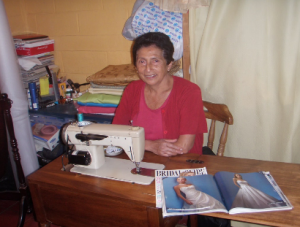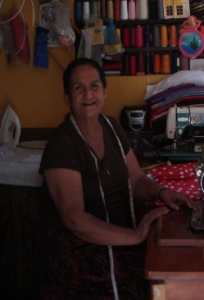by Patricia Hamill
Summer 2012 InGear

Señora Antonieta Mesa and her sister Señora Irma Mesa were quite welcoming when David and Gary arrived to visit their sewing studios. These ladies clearly each know what market they want to focus on and how to keep their businesses thriving. Señora Irma makes her living by sewing school uniforms and selling to or doing custom work for the middle-class families of the town and she does her best to donate what she can to the poor families who cannot yet earn enough to purchase her clothes. Looking at the dresses made by Señora Antonieta really dispels the idea that only the very poor or unsophisticated are influenced by the outreach work of FIDESMA and P4P.

Señora Antonieta originally started her business using cheap plastic machines from an unknown source but, through the micro-credit provided by FIDESMA, she was able to get an older model heavy-duty machine from them. It could sew through thicker layers of more expensive cloth. This advantage enabled her to create the much coveted wedding dresses seen in high-end bridal magazines and the very necessary lovely gowns for young women’s “sweet 15” parties. Yes, 15 not 16. The age may differ, but the idea is the same. Señora Antonieta does rely on yardage from overseas for the more intricate orders, but she is often able to make use of fabric made in Guatemala. And these knock-offs don’t compete with the real thing because the stores that sell these types of dresses are nowhere near these ladies or their customers. It’s fair competition for a fair price. Imagine being able to own something exactly like the design you saw in Vogue or Cosmopolitan for the equivalent of $500? No, it’s not cheap, but much cheaper than the real thing, available locally, and excellent quality.
This duo of sisters contributes to the clothing of daily use and to the elegance and beauty of special occasions. They apply wise business practices that can be implemented with little impact on the environment. Local products, personal service, reasonable prices, sustainable practices—all because of P4P’s machines and FIDESMA’s micro credit and determined distribution practices.
